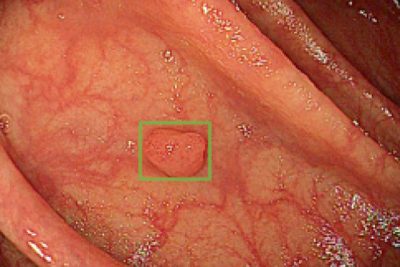Using artificial intelligence for polyp detection in colonoscopy
A research project is investigating whether the use of artificial intelligence can improve the detection rates of polyps in colonoscopy.

AI identifies areas of interest in a colonoscopy
Bowel cancer is the fourth most common cancer affecting people in Australia and it is estimated that one in 20 people will be diagnosed by the time they are 85. If bowel cancer is found early, more than 90 per cent of cases can be successfully treated.
A colonoscopy is a procedure used to look for changes in the bowel, including pre-cancerous polyps which can lead to bowel cancer. During a coloscopy, a long, flexible tube called a colonoscope is inserted into the rectum. A tiny video camera at the tip of the colonoscope allows the doctor to view the whole length of the colon.
While a colonoscopy is the best method for detecting pre-cancerous polyps, very small or flat lesions are harder to detect and can be missed. Technologies have been developed to improve polyp detection including artificial intelligence (AI).
Lead researcher Dr Mark Appleyard said utilising AI shows promise in improving detection rates.
"AI has enabled the development of computer-aided detections systems which highlight polyps to the clinician in real time. The AI has been fed thousands of polyp images so has been trained to identify subtle features on the colonoscopy monitor that might represent a polyp (and places a green square around the suspected polyp). The endoscopist can then interrogate that area more closely and confirm if a polyp is indeed present," Dr Appleyard said.
"The research project is evaluating the impact of AI in detecting adenomas and serrated polyps (pre-cancerous polyps) compared to a colonoscopy conducted without AI.
"If AI assisted colonoscopies are found to improve the detection of adenomas and polyps, this could lead to the prevention of bowel cancer cases, potentially saving lives.
"We are also looking to develop our experience with AI further in a new study using other technology that has the potential to characterise and diagnose polyps in real time on the screen. The benefit of this is that polyps may no longer need to be sent for pathological assessment," he said.
